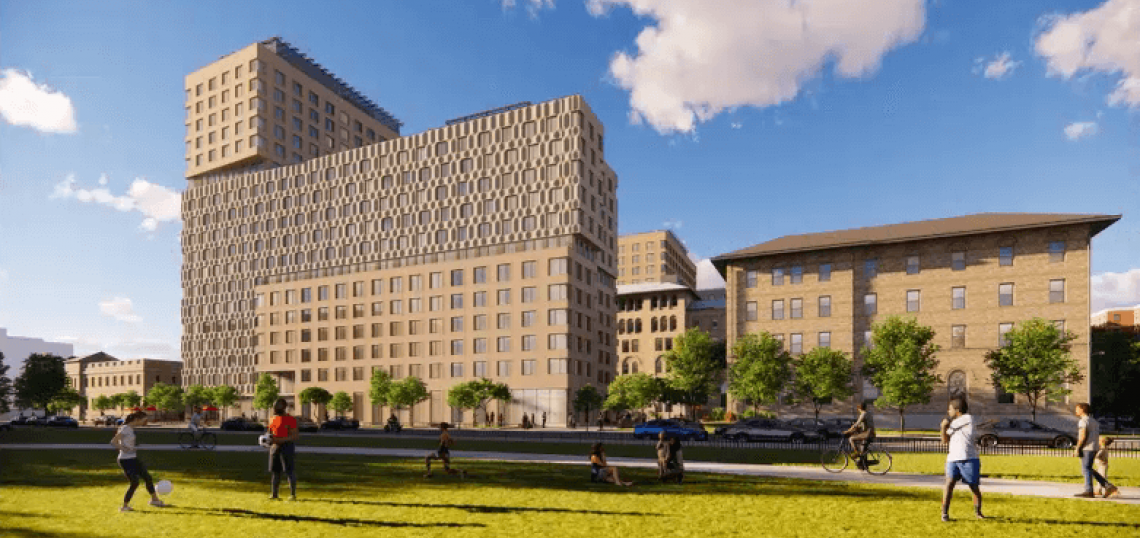Greenpoint Hospital will finally be turned into affordable housing and a homeless shelter: Plans for a long-awaited affordable housing development at the long-ignored Greenpoint Hospital site in East Williamsburg were enthusiastically embraced by local residents at an evening hearing Tuesday. Hudson Companies Inc., who was selected by the city along with Project Renewal and St. Nicks Alliance as the development team in 2018, presented a fuller picture of the project, including new renderings and details about the affordability breakdown, to Community Board 1 on April 13. (Brownstoner)
Hudson Yards is getting a farmer's market: "One of the city's most built-up areas will get an infusion of green thanks to a new farmers market that will open in Hudson Yards this month. The inaugural Farmer's Market at Hudson Yards will open for the season on April 22 in the development's open area between 10th and 11th Avenues and 30th and 34th streets. It will be open 8 a.m. to 5 p.m. every Tuesday and Thursday through the fall, offering local produce, baked goods, coffee, flowers, prime meats and more." (Patch)
Brooklyn Public Library program gives ambitious entrepreneurs a leg up: The Brooklyn Public Library launched its annual PowerUP! competition this week, offering Brooklyn’s aspiring entrepreneurs free courses in business and the chance to win a grand prize of $20,000 in seed money. PowerUP! began in 2003 to provide businesses a helping hand after 9/11. Since then, more than 1,000 business plans have been submitted, and the contest has awarded $450,000 to more than 125 entrepreneurs. (Brooklyn Eagle)
Brooklyn Bridge Bike Lane "won't be truly awesome": "DOT representatives told Community Board 2 in Brooklyn that the Brooklyn Bridge roadbed bike lane only takes one Manhattan-bound lane for a two-way eight-foot bike lane because the de Blasio administration sprung the plan on them. 'This bike lane is being implemented completely within our DOT in-house forces in compliance with what the mayor announced at the State of the City, that this was going to be done this year,' DOT Executive Director of Community Affairs Joannene Kidder told the board’s Transportation Committee on Thursday night. 'We’re not able to do any capital projects on that kind of timeline. Since the mayor announced it in January, and this bike lane is expected to be open later this year, in order to meet that deadline, we’re doing the most straightforward approach to opening this bike lane. It doesn’t preclude [DOT] putting in what all feel is a better or more workable bike lane in the future. This is the best the bike lane that we could provide in 2021.'" (Streetsblog)
Living at the Chelsea Hotel means perpetually living in limbo: "For the past decade, the residence hotel on West 23rd Street, a New York character unto itself, has been suspended in a dreary state of endless construction, with a rotating cast of developers struggling to spin this oddity into an upscale boutique hotel. Even as the pandemic decimates the city’s economy, closing scores of hotels, restaurants and stores, and leaving tens of thousands of New Yorkers unable to pay their rent, the 12-story Chelsea continues to exist in a world unto itself, one that seems to host a seemingly endless cage match where the building’s roughly 50 remaining tenants spar with one another or with the landlord who, in turn, battles with the city." (NYT)
 The Era at 251 West 91st Street | ODA
The Era at 251 West 91st Street | ODA
ODA, known for their irregularly stacked boxes, makes a mark on the Upper West Side: "As per a teaser website, the new condo in the works at has been dubbed Era in honor of what architect ODA hopes it is ushering in for the Upper West Side. Some locals aren’t so enthusiastic about the possibility, describing the new building as 'a big, ugly cantilever,' but the Department of Buildings found it in compliance with building codes and zoning regulations." (CityRealty)
Resident migration patterns: "Resident migration patterns are shifting as a result of COVID-19. Using frequently updated U.S. Postal Service data, this interactive report illustrates where people are choosing to live and the implications for occupier location and talent strategies and commercial real estate investment decisions." (CBRE)






